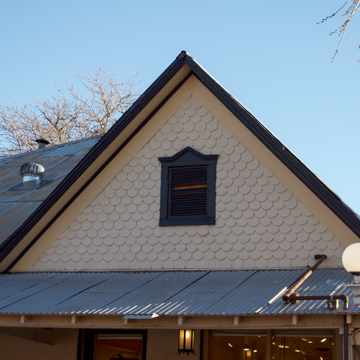You are here
Romero Street Gallery
Built as a grocery store by a prosperous local merchant and Bernalillo County official, the Jesús Romero Store is located a short distance from the plaza’s southwest corner and replaced Albuquerque’s first Central Bank (1878), which was razed in the late 1880s after a new bank was erected in New Town. Largely unaltered, the Territorial Style building exemplifies the local commercial vernacular of the late nineteenth century in its combined use of adobe construction with a portico of squared posts and milled lumber, plate glass windows, and corrugated metal roofs. While the roof’s complex, irregular profile may not have been influenced by the Queen Anne Style, as some have suggested, the small corner gable over the main entrance and the larger gable with scalloped shingles on the east end both command the building’s large site at the corner of Romero Street and South Plaza. Adapted to serve a variety of commercial functions since its construction, the Romero Store retains its original stamped metal ceiling and hardwood floors on the interior.
References
DeWitt, Susan, “Old Albuquerque Historic District,” Bernalillo County, New Mexico. National Register of Historic Places Inventory–Nomination Form, 1980. National Park Service, U.S. Department of the Interior, Washington, D.C.
Johnson, Byron A. Old Town, Albuquerque, New Mexico: A Guide to Its History and Architecture. Albuquerque, NM: City of Albuquerque, 1980.
Writing Credits
If SAH Archipedia has been useful to you, please consider supporting it.
SAH Archipedia tells the story of the United States through its buildings, landscapes, and cities. This freely available resource empowers the public with authoritative knowledge that deepens their understanding and appreciation of the built environment. But the Society of Architectural Historians, which created SAH Archipedia with University of Virginia Press, needs your support to maintain the high-caliber research, writing, photography, cartography, editing, design, and programming that make SAH Archipedia a trusted online resource available to all who value the history of place, heritage tourism, and learning.



















